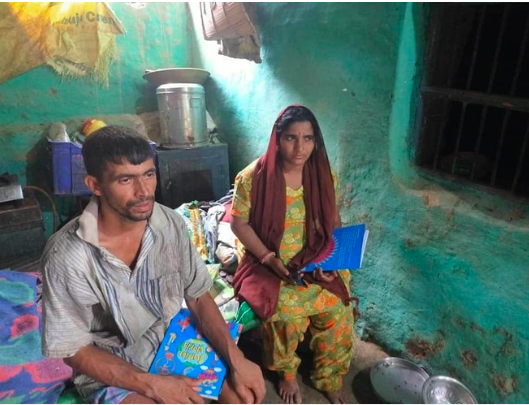Man sells cow to buy smartphone for online studies of his children

A poor man was forced to sell his cow, his only source of income, for Rs 6,000 “80 $” for buying a smartphone for online studies of his two children.
Kuldip Kumar belongs to Gummer village in Jwalamukhi. With the lockdown in force in March, schools were also closed. His children, Annu and Dippu, were studying in Class IV and Class II. As the schools started online classes pressure mounted on Kuldip to buy a smartphone for the children to continue the study.
For a month, Kuldip moved from pillar to post to get a loan of Rs 6,000 to buy a smart phone. He approached banks as well as private lenders but, because of his poor financial condition, none was ready to help him.
In tears, Kuldip told this reporter said since the schools were closed, he was told by teachers that children needed a smart phone if they wanted to continue their studies. He said as he did not have even Rs 500, arranging Rs 6,000 was a Herculean task.
When he failed to get money despite all efforts, he sold his cow for Rs 6,000 and purchased a smartphone for the education of his children.
Kuldip lives in a mud house. Kuldip has neither a below poverty line (BPL) card, nor is he a beneficiary of the Integrated Rural Development Programme (IRDP). Kuldip said he had given a number of applications to panchayat for financial assistance for the construction of the house and inclusion of his name in the IRDP, BPL and Antodaya, but all in vain.
The government survey said 23.48% of the 21,387 people whose blood samples were tested had Covid-19 antibodies.
It suggests that infections in the city are much more widespread than the number of confirmed cases indicates.
Delhi has so far recorded 123,747 cases, equivalent to less than 1% of its population of 19.8 million.
At 23.44%, the number of infections would be 4.65 million in a city that size. A government press release says the difference shows that “a large number of infected persons remain asymptomatic”.
It even says the figure of 23.48% may be too low because Delhi has several pockets of dense population. But it adds that “a significant proportion of the population is still vulnerable” and all safety measures must be strictly followed.
Tags
Related Posts
Girls facing higher risk of ‘summer’ marriages in Middle East and North Africa
Girls in the Middle East and North Africa are in greater danger of being forced or sold into ‘tourist’ or ‘pleasure’ marriages due to the surge in poverty, displacement, and the COVID-19 pandemic, Save the Children warned ahead of a global meeting next week on gender equality….
June 27, 2021Traffickers found targeting more children as COVID-19 school closures fuel danger
Human traffickers worldwide are increasingly targeting children and will likely exploit school closures during the coronavirus pandemic to abuse the young, the United Nations said on Tuesday….
February 3, 2021


